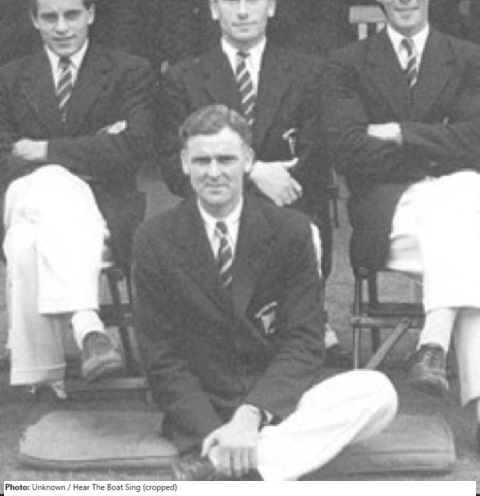Jack Dearlove

Biographical information
| Roles | Competed in Olympic Games |
|---|---|
| Sex | Male |
| Full name | Jack Gilroy•Dearlove |
| Used name | Jack•Dearlove |
| Born | 5 June 1911 in Fulham, England (GBR) |
| Died | 11 July 1967 in Bromley, England (GBR) |
| Affiliations | Thames Rowing Club, Putney (GBR) |
| NOC |  Great Britain Great Britain |
| Medals | OG |
| Gold | 0 |
| Silver | 1 |
| Bronze | 0 |
| Total | 1 |
Biography
Following an accident in Acton on 2 May 1923, Jack Dearlove’s life changed forever. On that day, Dearlove, and a fellow schoolmate, William Metcalf, the son of a local barrister, were riding on a bicycle together when they fell and were run over by a passing lorry. The two boys each had a leg amputated but, sadly, Metcalf eventually died from his injuries. Dearlove survived, but had to endure the now-unacceptable prejudices that went with being disabled in those days. Before he lost his leg, Dearlove was a member of the cricket first XI at Lynton House school, Holland Park, London, and a team photo shows Dearlove sitting on the front row of the photograph. This was before his accident. When he appeared on the next picture, he had been relegated to scorer, and had to stand at the back of the photograph, and behind a bush, so nobody could see his disability.
More than 20 years later, Dearlove was to be the subject of a similar prejudice at the 1948 Olympics. As cox to the British rowing eight, he was scheduled to take part of the parade of athletes at the Opening Ceremony but the “powers to be” thought it would be wrong for the rest of the world to see a British athlete parading on crutches, and Dearlove had to watch the event from the stand. That humiliation did not deter him, and he guided the British eight to the silver medal, as he became one of the few “disabled” athletes to win a medal at a regular Olympics.
Dearlove took to rowing because he felt he was on equal terms to his rivals and he went on to enjoy a successful career as a cox, winning many prestigious races with the Thames RC eight at Regattas on the River Thames. The one he sought most was the Grand Challenge Cup at Henley and, having twice lost to Leander in 1929 and 1932, he eventually achieved his ambition when the Thames eight gained revenge over their old rivals by winning the title in 1948, to make it a memorable year for Dearlove. In 1950 he won a bronze medal at the Empire Games, representing England.
Dearlove enjoyed a successful career in the planning department of Sainsbury’s, and played his part in the introduction of the company into the supermarket business in the United Kingdom. He died in a car crash in 1967 that may have been caused as a result of him having a heart attack. Dearlove’s youngest son was Sir Richard Dearlove, former head of MI6 and later at Master at Pembroke College, Cambridge, while his daughter Ann was the headmistress at the famous Roedean girl’s school.
The Official Report on the Opening Ceremony of the 1948 Olympics said: “Thus were launched the Olympic Games of London, under the most happy auspices.” Maybe Jack Dearlove, sitting in the stand would not have agreed? Had his situation existed when the Games were next held in London in 2012, then Dearlove would probably have been seen heading the procession of British athletes at the Opening Ceremony, and not watching from the stand.
It is with a certain irony that at the very moment Jack Dearlove was sitting in the stand watching the Olympic Opening Ceremony on 29 July 1948, Ludwig Guttmann was organizing the first Games for people with disabilities at Stoke Mandeville Hospital, when 16 wheelchair bound people took part in an archery competition, in what would be the forerunner of the Paralympics.
Results
| Games | Discipline (Sport) / Event | NOC / Team | Pos | Medal | As | |
|---|---|---|---|---|---|---|
| 1948 Summer Olympics | Rowing |  GBR GBR |
Jack Dearlove | |||
| Eights, Men (Olympic) | Great Britain | 2 | Silver |
Special Notes
- Listed in Olympians Who Won a Medal at the British Empire/Commonwealth Games (0–0–1 1950 Auckland ROW bronze: eights (competed for England))
- Listed in Olympians With a Disability (Right leg amputee.)
- Listed in Olympians Who Died in Motor Vehicle Accidents (Boat/Car/Motorcycle/Train) (Died in a car accident, possibly as a result of having a heart attack.)